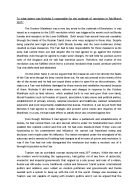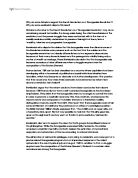To what extent were the Bourgeoisie responsible for the outbreak of Revolution in 1789?
“To what extent were the Bourgeoisie responsible for the outbreak of Revolution in 1789?”
By Andrew Warnes 12E
In many ways, the calling of the Estates General, the idea of being promoted to a higher class, more specifically, the Second Estate, and the idea of the Bourgeoisie rising up to gain power might have caused the outbreak for revolution. However, with the extent of the Enlightenment, the American War of Independence, the influence of the Clergy, the Aristocratic Revolt and the ever growing financial crisis, the role of the Bourgeoisie in the outbreak of the revolution was undermined.
Firstly, the idea of the Bourgeoisie weren’t responsible for the revolution came from the Tennis Court Oath. When the National Assembly were locked outside of the meeting for the Estates General on the 20th June, they decided to meet in the local tennis court in Versailles. With the evidence of the painting, ‘The Tennis Court Oath’ by Jacques Louis David, it shows that many different classes were joining together, from the nobility and the clergy, towards to the Bourgeoisie as well. Also, the National Assembly was an assembly not of the Estates but of "the People."This shows that the Revolution was a mixture of many groups different efforts, not just the Bourgeoisie.
Another reason why the Bourgeoisie weren’t responsible for the revolution was the influence of the Enlightenment period on the Revolution. The philosophes were French writers, including Voltaire, Diderot, Montesqieu and Rousseau, who formed part of the intellectual movement known as the Enlightenment. The Catholic Church was condemned by the philosophes as intolerant, wealthy and corrupt, and Voltaire proclaimed ‘Ecrasez l’infame’. Therefore by the very nature of their questioning and critique, the philosophes undermined the position of the Church and the role of the King as God’s servant in France. The philosophes were in favour of liberty and argued for freedom of the press, speech, of trade and of freedom from arbitrary arrest, which was a direct criticism of the king’s power of letter de cachet. They also believed in equality before the law and thus were critical of the inherent inequality before the law within the Ancien Regime which saw the Second Estate have the right to be heard in a high court of law and to be beheaded rather than hanged if found guilty of a capital offence. However, although the ideas of the philosophes challenged the abuses of the Ancien Regime, they were a movement of the educated elites for the educated elites. Without the financial crisis that the Crown experienced from the 1770s and the political mistakes made by Louis XVI in an attempt to resolve the financial crisis it is very unlikely that the ideas of the philosophes would have led to revolution. However, with the the ideas of Enlightenment, they managed to succeed in creating a new state across the ocean called the USA, showing that the ideas of critiquing religion and a separation of church and state work with the creation of a new state, based on the principles of democracy and fairness that all people can do well in life, not just the upper classes.








